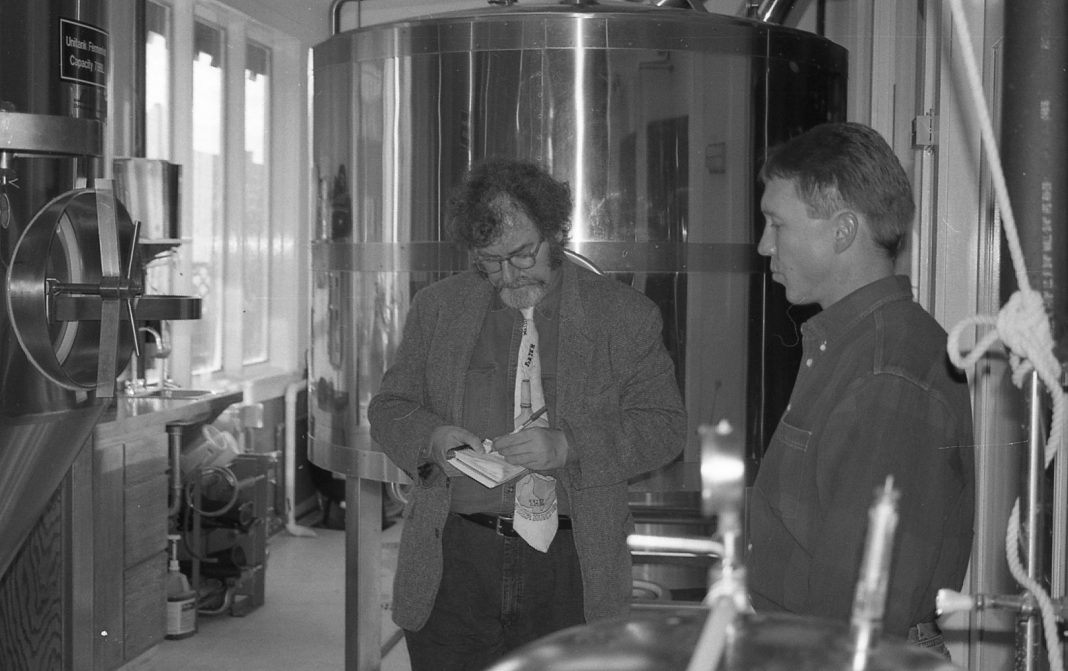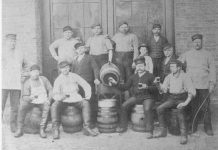—
Today’s column first appeared in F&D’s most recent print edition: Summer 2023 — the 20th Anniversary Issue. The cover photo of beer writer Michael Jackson and brewer David Pierce was taken at BBC’s original Shelbyville Road location in 1994.
—
Standing the Test of Time
Two decades later, these three local breweries are still crafting great beers
When Food & Dining Magazine appeared in metropolitan Louisville for the first time in 2003, only five “microbreweries” were active here. Today the number approaches 40, but we don’t refer to them as “micros” any longer. Rather, in 2023 the accepted usage is “craft” breweries.
And yes, it’s now the Golden Age for craft beer lovers. At F&D we’ve often observed that America’s beer and brewing renaissance is a joyfully malleable concept. Seemingly infinite conceptual flexibility has resulted in an incessant, restless evolution and exponential growth. As fans, we’re both stunned and gratified by the range of expanded choice.
One measure of this shape-shifting is the Great American Beer Festival (GABF), held annually in Denver, Colorado. In 2003 there were 65 style categories delineated for the GABF’s medal competition. Last year there were 98, reflecting a proliferation of IPAs, sours, “farmhouse” ales and flavored stouts, which have usurped traditional pale ales, ambers and porter on so many beer lists.
Another reflection of changing times: In 2003, most brewery startups still found it obligatory to function as restaurants (called “brewpubs”), compelling dual outlays of precious capital for expensive brewing equipment and full kitchens. These days the slimmed-down “taproom” model is king, with breweries minimizing costs by purchasing patio furniture and contracting with outsiders to run snack kiosks and food trucks on site.
All is flux and nothing stays still, so what has become of the five Louisville breweries operating at the time of F&D’s 2003 founding?
One of them is unchanged. The second perseveres, albeit downsized. A third has reinvented itself and expanded. The remaining two have passed from the scene, but their bricks and mortar enjoy vibrant afterlives under different stewardship.
I’ll begin my survey with those two departed breweries.
—
Browning’s Brewery (and restaurant) debuted in 2002 at Louisville Slugger Field (401 E. Main St.), swapping owners for a 2009 reboot before folding for good in 2011. Gone was She-Devil IPA, but the stage was set for Against the Grain (AtG) Brewery & Smokehouse’s tenancy later the same year. AtG has since emerged as Louisville’s generational craft beer standard bearer.
Concurrent with AtG’s steady ascent as a nationally renowned craft brewer, Cumberland Brews (2000) at 1576 Bardstown Rd. in the Highlands began showing unmistakable signs of old age. Cumberland ended in 2019 and AtG immediately stepped into the breach, remodeling the warm, compact restaurant and brewery space into a Public House of its very own.
By almost any measure, Bluegrass Brewing Company (BBC) is the granddaddy of new-era Louisville “microbreweries” (sorry, I just can’t help it). BBC’s brewers began shoveling spent grain in 1993, and while old-timers (read: me) lament the loss of the original St. Matthews flagship location in 2017, the brand lives on at 300 W. Main downtown.
Founded in 2010, BBC at 3rd and Main is situated inside a beautifully repurposed historic bank building opposite the KFC Yum! Center, boasting a full-service restaurant, on-site brewery and Bourbon Barrel Loft event space. Old-school BBC beers like American Pale Ale, Dark Star Porter and Alt Bier continue to be brewed.
2023 is BBC’s 30th anniversary year, and I hope to be invited to the party, given that I was there on opening night in 1993. Too bad the duck ravioli no longer graces the menu.
In 2001 the original BBC in St. Matthews absorbed the failed Pipkin Brewing Company (1998-2001) at 636 E. Main downtown, now known as the NuLu district. A second corporate entity was capitalized, and the production-oriented BBC Beer Company was born.
Thus began a tumultuous and melodramatic period of wonderful beer balanced by unremitting internal strife stemming from ownership disputes between the BBCs. Eventually they agreed to lead separate lives, and in 2015 the facility’s backers completely rebranded and overhauled the enterprise, henceforth Goodwood Brewing Company.
Goodwood has become Louisville’s largest beer producer by volume, with its signature Bourbon Barrel Stout aptly referencing “bourbonism’s” zeitgeist. Goodwood’s founding taproom has been augmented by similar configurations in Frankfort and Lexington, Kentucky, and full-service brewpubs in Indianapolis, Indiana and Columbus, Ohio.
This brings us to the pleasingly retro outlier, New Albanian Brewing Company Pizzeria & Public House at 3312 Plaza Drive in New Albany, Indiana, the Louisville-area brewpub that has changed the least since F&D’s first issue in 2003.
NABC, formerly Sportstime Pizza and Rich O’s Public House (originating in 1987 and 1990, respectively), is 100% woman- and family-owned. The brewery’s first batch came in 2002, making it Indiana’s 9th-oldest craft brewery in continuous operation.
Occasional bouts of interior revision haven’t altered NABC’s refrigerator pizzas, Elector Ale, breadsticks, Community Dark, beer cheese, and a moderately priced selection of guest beers.
(Full disclosure: I was an NABC co-owner from 1990 through 2018, and persist in dining and drinking there.)
—
My first F&D beer column came with the Summer 2004 (Vol. 05) issue, in which I denounced mass market lagers and suggested alternative choices for hot weather among imported and American made beers.
A great many beer-related topics have been discussed in this space since then, but I’ve seldom touched on beer wholesalers.
Recall that the repeal of Prohibition brought the implementation of a “three-tier” system for the distribution of beverage alcohol in America, stipulating a layer of middle men between producers and retailers. These three tiers remain largely intact, albeit blurred by exceptions in many states for small brewers, vintners and distillers, which enable innovations like the aforementioned brewery taprooms, as well as the option of self-distribution for small-scale producers.
For as long as I’ve worked in the beer business (since 1982), the family-owned firm of L.C. Nadorff & Son has been the wholesale distributor for AB-InBev (Budweiser) in New Albany and Floyd County, Indiana.
My 41 years of service is exceedingly small beer compared with Nadorff’s jaw-dropping tenure. When Prohibition’s restrictions ended in 1933, Nadorff jumped back into wholesaling, having acted as the local sales agent for Evansville’s Cook’s Goldblume beer through World War I.
But staggeringly, the Nadorff family’s involvement with beer extends all the way back to 1877, when Frank Nadorff bought the Spring Brewery from Louisa Sohn, widow of the founder. The brewery was located off Vincennes Street near present-day New Albany High School, and ran until 2007, when the Nadorffs switched to wholesaling.
Accordingly I’m saddened to divulge that on January 1, 2023 the firm of L.C. Nadorff & Son ceased to exist at the tender age of 146, having sold its portfolio to Orange County Beverage from French Lick, itself dating to the 1940s.
Verily, consolidation in beer wholesaling proceeds apace, and “little guys” like Nadorff find future business prospects questionable, even when possessing profitable product lines like AB InBev’s. An auction of Nadorff’s contents concluded a truly epochal longevity that owed to many factors, not the least of which were successive generations of family members willing to perpetuate the enterprise.
As with Nadorff, the two micro-cum-craft brewers BBC and NABC have enjoyed stable family ownership. Taken together, they’re 56 years old in 2023. Throw in 25 years for the various entities operating where Goodwood brews now, add F&D’s two decades, and the total is 101 years—still almost five decades fewer than Nadorff’s mind-blowing tally.
(This column will be updated in 2043, when F&D observes its 40th birthday.)




















 Roger Baylor is an entrepreneur, educator, and innovator with 41 years of beer business experience in metropolitan Louisville as a bartender, package store clerk, brewery owner, restaurateur, writer, traveler, polemicist, homebrewing club founder, tour operator and all-purpose contrarian.
Roger Baylor is an entrepreneur, educator, and innovator with 41 years of beer business experience in metropolitan Louisville as a bartender, package store clerk, brewery owner, restaurateur, writer, traveler, polemicist, homebrewing club founder, tour operator and all-purpose contrarian.




